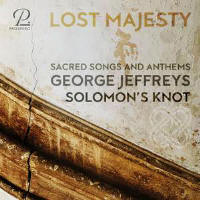Texte paru dans: / Appeared in: |
|
|
|
|
|
We know nothing about Jeffreys before 1631, when he made contact with the Hatton family, for whom he worked over the following years in a ‘secretarial capacity’ while also composing. Copies of the latest Italian music in Jeffreys’s hand demonstrate that he closely followed continental developments, which filter through to his own music: expressive dissonance and chromaticism, contrasting sections of homophony and polyphony, virtuosic writing, declamatory passages and many delicious harmonic progressions – quite different from the late polyphonic styles that preceded him. One huge advantage Solomon’s Knot have in this type of music is the unrelenting beauty of their individual voices: listen for the cascading phrases in the four-voice work What praise can reach thy clemency.
The headline piece here is In the midst of life, a funeral text set by Jeffreys during his own life-threatening illness. This is bold music that conjures strange harmonies and ends with a minor-key alleluia, and it is sung with sensitivity and confidence. Similarly, The Lord in thy adversity, a paraphrase by George Sandys of Psalm 20, strikes a delicious balance between fragility and sure-footed navigation of multiple harmonic twists. Listen for the delicate opening and delightful word-painting on ‘perfume’: this is highly nuanced music, for sure, but Solomon’s Knot clearly have the measure of it. What praise can reach thy clemency – another text by George Sandys, this time a paraphrase of Isaiah 38 – has many beautiful moments that these performers relish, especially ‘I therefore to the warbling string / His praise will sing’. Finally, there are vocal contrasts as well: consider Turn thee again from Psalm 80, richly performed by lower voices, who lean into the wonderful harmony at ‘and giv’st them plenteousness of tears to drink’ and find many colours in a particular luscious passage on the words ‘Thou has brought a vine out of Egypt’.
I’m apt to agree with the marketing copy that this recording will ‘undoubtedly show that [Jeffreys] is the great “forgotten” composer of the English 17th century’. Certainly these excellent performances will help. |
|




